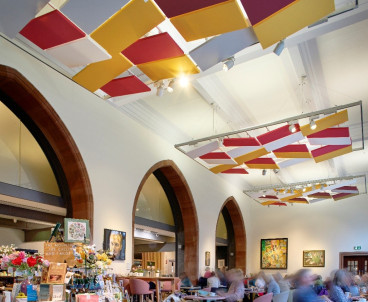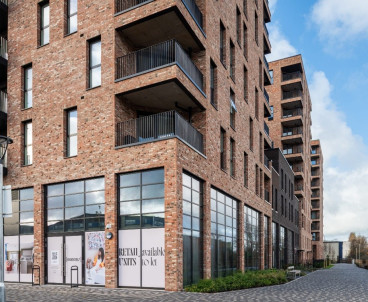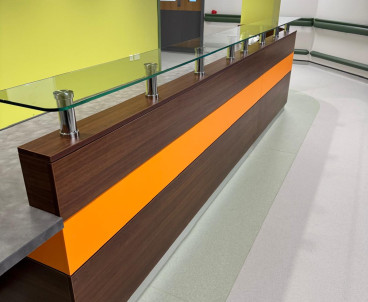Cavity tray system future proofs new development
The Keyfix Non-Combustible Cavity Tray has been installed as part of a new residential development in South London, ensuring that the building is fully compliant with building regulations for years to come, as well as offering improved buildability.
Led by developer Notting Hill Genesis, design and build contractor McAleer & Rushe, and architect Cartwright Packard, Olive Morris House is a new build residential development that forms part of the Brixton Hill regeneration project.
Replacing the former council offices, the regeneration project heralds the construction of a new seven storey building, overlooking Rush Common. This new structure will house a total of 74 residential homes, comprising 44 private residences, 30 of which are considered affordable, available in various configurations of one, two, and three bedroom units. The construction is now complete, with the ground floor and basement of the building housing the London Borough of Lambeth archive.
Working closely with McAleer & Rushe, Keyfix supplied 1,620m of its Non-Combustible Cavity Tray (NCCT), 75 no. of its Non-Combustible Cavity Tray Lintel (NCCTL), 966 pre-formed Corner Units, and 5,582 Keyfix Non-combustible Weep Vents to the project.
Olive Morris House required products that not only adhere to current regulations but also surpass them, with a focus on future-proofing the building. As a result, main contractor, McAleer & Rushe specified Keyfix’s NCCT for this project due to its rigorous compliance with regulations and its ability to protect the building against future regulations. The NCCT is crafted from A1-rated, austenitic Grade 304 stainless steel, providing a high standard of fire resistance for the building. Moreover, the enduring quality of austenitic stainless steel guarantees the product's longevity, ensuring the building's resilience for over 100 years. Subsequently, the building will remain in compliance with evolving regulations, even as they become more stringent.
On this project, Keyfix was able to accommodate a unique masonry design which featured dog-tooth panelling. To support the complex style of panelling, the base of the NCCT tray was altered to align with the leading edge of the brickwork, to produce a robust and cohesive brick façade.
Throughout the project's duration, Keyfix consistently delivered outstanding levels of customer service to McAleer & Rushe. The project proceeded smoothly as the team actively engaged with the main contractor team and architects from the early stages of the design process. This proactive approach enabled the team to promptly and effectively address any issues that arose.
Keyfix offered extensive technical support to the stakeholders, which included active participation in design team meetings, regular follow-up calls to the site, conducting a Toolbox Talk, hosting a CPD webinar, conducting a thorough technical review of the architects' drawings, and the provision of a comprehensive component schedule and location layout plan.
As a point of innovation on this project, the brickwork contractor utilised the Keyfix Non-Combustible Cavity Tray Lintel, as opposed to the traditional design which comprises a lintel with a cavity tray above it. The Keyfix NCCTL is a hybrid of both products and is manufactured as one complete unit, to help save on installation costs and enhance buildability. The Keyfix NCCT’s self-supporting ‘one-piece system’ enables a simple and efficient installation, as it doesn’t require fixing back to the internal frame, therefore saving valuable time when bricklaying.
Additionally, the Keyfix NCCT is notable for its unique design that eliminates the need for tape or mastics to create watertight joints. This innovation mitigates the most common cause of product failure, resulting in a more robust and dependable system.
Stephen McGinty, Project Manager at McAleer & Rushe commented, “Keyfix consistently delivered outstanding levels of customer service and their technical support was excellent, responding quickly to any issues we had. The onsite installation of the one-piece NCCT system they provided went smoothly and efficiently thanks to Keyfix's expertise and the system was also able to accommodate the unique dog-tooth masonry detail which appeared on the project in localised areas. This self-supporting system not only meets but exceeds industry regulations for fire safety and thermal performance and I would have no hesitation in recommending Keyfix or utilising them again on other schemes.”
Commenting on the NCCT, Kieran Coyle of Keyfix stated, “The Keyfix Non-Combustible Cavity Tray was specified on this project due to its reputation for fire safety. The NCCT is an A1 fire rated system, providing our customers peace of mind as their building will always remain compliant with building regulations.”
The Olive Morris development has reached its completion, and the Keyfix Non-Combustible Cavity Tray has not only enhanced on-site efficiency but also secured the highest standard of long-term building safety for its occupants.
For more information about the Keyfix range of non-combustible solutions download the product guide, visit https://keyfix.com/or for technical support call 028 8676 7508 or email info@keyfix.com
Additional case studies



